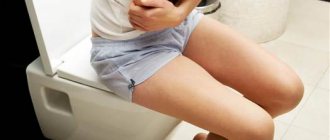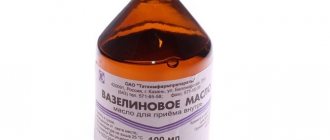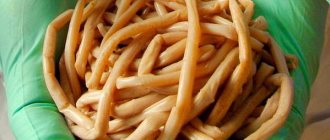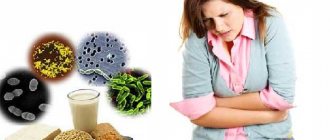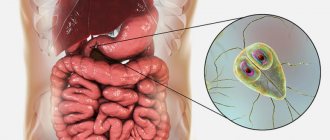Delayed bowel movement is a fairly common problem. Constipation can be an independent functional disorder of the intestines or a symptom of certain diseases. In cases where it is not possible to find changes in the intestines and other organs, they speak of primary constipation.
Measures such as following comprehensive recommendations and taking laxatives for adults will help restore normal bowel function. The drugs are classified into several groups and help to relatively quickly restore the process of intestinal cleansing, get rid of dense feces and improve well-being.
Some drugs act immediately, others are approved for long-term use and help normalize intestinal function in the long term. Today on the drug market you can find the following groups of laxatives:
- stimulating;
- stool softeners;
- voluminous - increasing the volume of intestinal contents.
Each group of drugs allows you to solve specific problems that cause stool retention.
Stimulant laxatives
Peristalsis-stimulating laxatives for constipation are so named because they irritate intestinal receptors. They act directly on the nerve endings of the intestinal mucous membranes, and some of them (castor oil) activate the motility of the small intestine, others activate the large intestine. The latter include drugs based on senna, buckthorn, sulfur, etc. There are also drugs that acquire an active form under the influence of intestinal enzymes. They work in both the large and small intestines.
It should be remembered that stimulant drugs, if used inappropriately, can cause serious side effects. The main complications include the effect itself: diarrhea may begin, accompanied by cramping abdominal pain. Due to diarrhea, the volume of fluid in the body and the amount of salts - potassium and sodium ions - decrease. Therefore, it is under no circumstances possible to maintain this state for a long time with the help of intestinal stimulants.
Chief gastroenterologist of the Main Medical Directorate Minushkin O.N. in his work emphasizes that “irritant laxatives, which realize the effect of their action through the receptor apparatus, ultimately lead to dependence of the intestinal function on their intake, to the deposition of melanin in epithelial cells and melanosis, dystrophic changes in the mucous membrane and toxic effects on the kidneys and liver. The final effect is an “inert gut”” (Minushkin O.N., 2003, p. 52).
The inert gut we are talking about is the so-called lazy bowel phenomenon. Due to excessive stimulation, the colon loses tone and requires more and more stimulating substances. Without a laxative, it simply loses its ability to contract and move feces.
Such constipation will progress, and this is an irreversible process. Doctors do not prescribe stimulant medications for more than 2 weeks due to rapid addiction. And in most cases, it is advisable to choose a safer laxative.
Development of a reflex to defecate
Diet is very important in the treatment of constipation, but sometimes it does not work if the patient does not develop the habit of bowel movements at certain times of the day. In order to strengthen the reflex, it is recommended to stimulate the act of defecation at the same time for several days. The most physiological is considered to be bowel movement 15–30 minutes after breakfast.
To speed up intestinal peristalsis, you need to drink a glass of cold water or juice in the morning on an empty stomach, then have a hearty breakfast. If, half an hour after eating, the urge to defecate does not arise, then you should try to induce it. To do this, you can massage the abdomen (stroking the abdomen clockwise), rhythmically retract the anus, press the area between the tailbone and the anus, squat, and perform physical exercises.
If the urge does not arise, then you can use a glycerin suppository. You should not sit on the toilet for a long time and push, as this can lead to the development of pathology in the anorectal area. The most physiological position is considered to be when the knees are slightly higher than the pelvis; for this, during bowel movements, you can put your feet on a low stand.
It is strictly forbidden to restrain the urge to defecate, since in this case the feces quickly dry out and move much more difficult through the intestines.
Softening laxatives
These drugs include the following:
- glycerol;
- oils: vaseline, almond;
- liquid paraffin;
- docusate sodium.
Softening substances help soak stool with water, make its consistency softer, and facilitate the passage of stool. Such laxatives literally lubricate the intestinal mucous membranes. However, today drugs of this group are used relatively rarely, which is associated with side effects when taking them.
In the work of Doctor of Medical Sciences, Professor Minushkin O.N., there is the following information about this: “The costs of drugs that soften fecal matter (or “lubricate”) <…> reduce the absorption of fat-soluble vitamins” (Minushkin O.N., 2003, p. 52).
Calculation of fluid volume for healthy children
Children under 1 year of age
should drink at least 100 ml of water per day.
For healthy children weighing from 10 to 20 kg
Water demand is calculated using the formula:
100 ml (volume of water for children under 1 year) + 50 ml per kg for body weight over 10 kg.
For example, with a weight of 12 kg: 100 ml + 2 x 50 ml = 200 ml.
A child weighing 20 kg should drink water: 100 ml + 50 x 10 = 600 ml
For children weighing over 20 kg
The following formula for calculation is proposed:
600 ml (volume of water for a child weighing 20 kg) + 20 ml for each kg with a weight over 20 kg.
For children over 3-5 years old
you can use the calculation of the amount of water: 30ml / kg weight
Bulk laxatives
Many experts consider bulk laxatives to be the drugs of choice: they are the first thing prescribed to people with constipation if the symptom cannot be managed through lifestyle changes and diet.
Such effective laxatives retain water in the intestines, swell, and increase the volume of intestinal contents, stretching its walls. Excessive stretching increases peristalsis and speeds up the emptying process.
The group of drugs includes the following subtypes:
- laxatives based on plant fibers;
- osmotic preparations based on macrogol, lactulose, salts.
Such drugs do not have a systemic effect, are not absorbed and do not enter the blood. Doctors note their effectiveness. For example, Doctor of Medical Sciences, Professor G. A. Grigorieva points out that “laxatives, which increase the volume of intestinal contents and reduce its viscosity, promote the physiological functioning of the intestine (G. A. Grigorieva, 2003, p. 12).
Let's take a closer look at each of the subtypes of bulk laxatives.
Get rid of intestinal problems
The natural British drug is not addictive and works immediately
Find Fitomucil with benefits
Based on polyethylene glycol (PEG), or macrogol
PEG is considered a poorly absorbed substance, which makes it capable of retaining water in the intestinal lumen. At the same time, macrogol does not lead to dehydration, it only delays the absorption of water. As a result, the stool acquires a more liquid consistency and the frequency of bowel movements increases.
Macrogol also has side effects: intestinal hypotension, which develops slowly, as well as potentiation of fecal incontinence. Therefore, it is recommended to take such drugs for no longer than 14 days.
Saline laxatives
These laxatives use concentrated salts:
- magnesium sulfate;
- sodium sulfate;
- Carlsbad salt.
Similar laxatives for constipation act at the level of the small intestine. They increase osmotic pressure, which allows fluid to be attracted and retained in the intestinal lumen. Under the influence of salts, feces become liquid and stools become frequent. This effect does not allow you to constantly take saline laxatives, since this is fraught with disturbances in salt metabolism and a decrease in a person’s quality of life.
People with kidney and cardiovascular diseases are also not recommended to use saline laxatives without consulting a doctor. Typically, these drugs are used in preparation for endoscopic examinations.
Lactulose based
Lactulose has a laxative effect indirectly, through beneficial intestinal flora. The component acts as food for bifidobacteria and lactobacilli. The latter release substances with an effect reminiscent of the effect of osmotic laxatives. In this case, profuse loose stools are not observed, since lactulose acts at the level of the large intestine.
With a single use, the laxative effect will occur within 1-2 days, but with systematic use it can appear within 2-4 hours. Lactulose is not absorbed in the intestine and does not have a systemic effect, but sometimes leads to bloating.
Based on dietary fiber
Dietary fiber (fiber) is a component of plant foods. Fiber is found in large quantities in bran, fresh vegetables and fruits, berries, and seaweed. There is also a lot of it in the shell of flax seeds and plantain (psyllium), and bran.
It is these components that are the basis of bulk laxatives. Some of the products with a similar effect contain cellulose.
Fiber swells in the intestinal lumen and increases the volume of feces. This leads to irritation of the intestinal walls due to distension. Insoluble dietary fiber gently stimulates the walls and improves peristalsis. Since dietary fiber actively absorbs water, it is important to drink enough fluids when taking fiber-based laxatives.
Such drugs can rightfully be considered mild laxatives - they do not provoke the so-called drastic effect, and their use is not accompanied by pain and cramps. However, they may not begin to work immediately and have a delayed effect.
A significant advantage of such laxatives is the possibility of long-term or even permanent use. In addition, these drugs have a minimum of contraindications, they are not addictive and act as physiologically as possible.
When choosing between bran-based preparations and psyllium-based laxatives, you should take into account that taking the former may be accompanied by increased gas formation. Therefore, in most cases, it is more advisable to use dietary supplements based on plantain seeds. One of these drugs is Fitomucil Norm.
What to feed a child with constipation?
If constipation occurs, it is recommended to exclude the following foods from your child’s diet:
- rice porridge;
- bananas;
- pasta;
- baking;
- whole milk;
- legumes;
- cabbage
It is recommended to exclude from the daily menu foods that have a negative effect on intestinal motility. These include coffee, chocolate, cocoa, and blueberries.
The child's diet should contain dishes with coarse fibers. Similar substances are found in cereals, fruits, and vegetables. For frequent constipation, bran products and whole grain bread are useful. Lean meat should also be included in your daily menu. It is recommended to bake beef or veal in the oven or steam it.
Preventive measures
The diet should contain a lot of vegetables, fruits, cereals and wholemeal flour; you can add wheat and oat bran as sources of fiber. It is better to cook vegetable soups. The child should drink a normal amount of liquid - fruit drinks, compotes, clean water, juices.
One of the most important conditions for normal bowel function is constant moderate physical activity. Any kind of sports or even just regular walks will be very useful.
You need to teach your child how to sit on the toilet correctly. Your feet are on the floor, your knees are bent, you can even raise your knees a little by placing a small bench under your feet, your torso is tilted forward. There is no need to push; on the contrary, you need to relax so that the intestines themselves perform the act of defecation.
Sources:
- P.L. Shcherbakov, L.N. Tsvetkova, V.V. Kashnikov. Chronic constipation in children // Issues of modern pediatrics, 2005, vol. 4, no. 4, pp. 54-62.
- HE. Komarova, A.I. Khavkin. Constipation in young children: causes and features of dietary correction // Issues of modern pediatrics, 2014, No. 13 (1), p. 114-118.
- M.I. Dubrovskaya, P.V. Parshina. Current issues in the development of constipation in children, approaches to therapy // Issues of modern pediatrics, 2012, vol. 11, no. 11, pp. 76-82.
Vostrikova Ekaterina Borisovna Clinic
Author of the article
Vostrikova Ekaterina Borisovna
Specialty: gastroenterologist
Experience: 14 years
The information in this article is provided for reference purposes and does not replace advice from a qualified professional. Don't self-medicate! At the first signs of illness, you should consult a doctor.
Prices
| Name of service (price list incomplete) | Price |
| Appointment (examination, consultation) with a gastroenterologist, primary, therapeutic and diagnostic, outpatient | 1950 rub. |
| Prescription of treatment regimen (for up to 1 month) | 1800 rub. |
| Consultation (interpretation) with analyzes from third parties | 2250 rub. |
| Consultation with a candidate of medical sciences | 2500 rub. |
| Ultrasound of the abdominal organs (comprehensive) | 2900 rub. |
| Ultrasound of the retroperitoneal space (and retroperitoneal lymph nodes) | 1400 rub. |
| Ultrasound of the gallbladder | 1400 rub. |
| Ultrasound of the abdominal organs (comprehensive) | 2900 rub. |
| Ultrasound of the liver | 1600 rub. |
| Ultrasound of the spleen | 1600 rub. |
| Diagnosis of Helicobacter pylori infection (HELPIL test) | 1200 rub. |
| Colonoscopy | 5600 rub. |
| Biopsy during endoscopic examination (1 biopsy) | 1000 rub. |
| Body composition assessment - bioimpedance analysis | 2150 rub. |
| Body composition assessment - repeated (bioimpedance analysis) | 1750 rub. |
| Esophagogastroduodenoscopy (EFGDS) | 3500 rub. |
The importance of timely diagnosis
The main thing is, of course, a preliminary consultation with a pediatrician. He can refer the child to a gastroenterologist, who will prescribe all the necessary medications. No self-medication: only doctors have the right to determine the dose and frequency of administration. This also applies to folk remedies - it is unknown what the reaction of the child’s body will be.
Today on sale you can find both children’s laxatives in the form of syrups and suppositories, as well as more gentle folk methods. However, you need to understand that in a situation of exacerbation it is necessary to seek specialized help. In some cases, constipation may be a sign of more serious pathologies.
